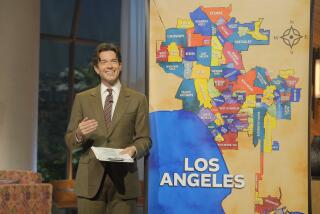Antitrust Issue Raised by Theater Owner : Paramount Film Booking to Be Probed
At a federal judge’s behest, antitrust lawyers for the Justice Department agreed Wednesday to conduct an inquiry into Paramount Pictures’ distribution practices in Lubbock, Tex., after an independent theater owner there testified that he has been cut off from Paramount product.
Paramount’s parent company, Gulf & Western, recently acquired theaters in Lubbock and one of them is showing Paramount’s latest film, “Beverly Hills Cop II.” Independent theater owner R. A. “Skeet” Noret said his bid to show the hit film was spurned, and he cited that experience as proof that independent theater owners are suffering from a wave of mergers between motion picture distributors and large theater chains.
Noret traveled from Texas to testify at a hearing to determine whether another motion picture company, Tri-Star Pictures, will be allowed to exhibit its own films in its newly acquired Loews Theatres chain. Since Tri-Star purchased Loews last December, the two companies have been operating at arm’s length under court order, because Loews is prohibited from exhibiting its own films under an old antitrust consent decree.
After a three-hour hearing, U.S. District Judge Edmund L. Palmieri said he will probably rule in Tri-Star’s favor but wanted more time to mull the day’s testimony.
Palmieri has monitored the compliance of major movie companies with antitrust laws for the past 33 years. The so-called “Paramount Decrees,” signed in the late 1940s and early 1950s, broke up Hollywood’s monopoly on film production, distribution and exhibition.
Tri-Star, founded just five years ago, would have escaped review had it not acquired the consent-bound Loews. Palmieri said of Tri-Star: “It’s not only a newcomer; it has a clean past.”
The judge expressed greater concern over Noret’s testimony about Paramount, and the theater owner’s copy of a Paramount letter stating that Paramount “will select the theatre or theatres that are most appropriate . . . “ in Lubbock.
“It is somewhat alarming for me to see a letter of this kind, dated Feb. 19, 1986, if it’s an indication of what’s going on in the industry,” Palmieri said. “On the face of it, you can’t tell whether it’s a flagrant violation of the antitrust laws or not.”
Fred E. Haynes, assistant chief of the Justice Department’s antitrust section that monitors the industry, assured the judge, “We will certainly look into it.”
When told of the day’s events, a Gulf & Western spokesman said, “We license our films theater by theater, on the merits, including Lubbock. We will be happy to review the matter with the Justice Department.”
More to Read
The biggest entertainment stories
Get our big stories about Hollywood, film, television, music, arts, culture and more right in your inbox as soon as they publish.
You may occasionally receive promotional content from the Los Angeles Times.






